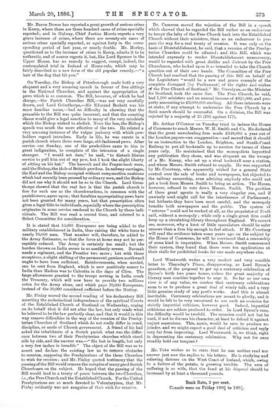Mr. Arthur O'Connor on Tuesday tried to induce the House
of Commons to crush Messrs. W. H. Smith and Co. He declared that the great newsdealing firm made £148,000 a year out of the London papers—an exaggeration—and moved that it should be an instruction to the London, Brighton, and South-Coast Railway to put all bookstalls up to auction for terms of three years only. He maintained that the monopolists boycotted any publication they chose, and was eloquent on the wrongs of a •Mr. Kenny, who set up a rival bookstall near a station, and whom Messrs. Smith refused to supply. He was supported by Mr. Courtney, who apparently wished for a general State control over the sale of books and newspapers, but objected to the railway censorship, even advising anybody who could not get a book from Messrs. Smith to bring an action. The House, however, refused to vote down Messrs. Smith. The position of these great agents is really a very singular one, and if unwisely used might call for the interference of Parliament ; but hitherto they have been most careful, and the monopoly benefits both newspapers and the public. The system of " returns " could not be worked at all, as the proprietor of Truth said, without a monopoly ; while only a single great firm could keep up a circulating-library throughout England. We cannot see, moreover, why a knot of little speculators should be safer censors than a firm big enough to feel attack. If Mr. Courtney will read the evidence taken some years ago on the subject by the House of Commons, he will be convinced that a censorship of some kind is imperative. When Messrs. Smith commenced their system, they found that there were ten applications at their stalls for prohibited books for one made anywhere else.


































 Previous page
Previous page